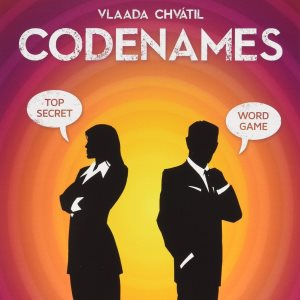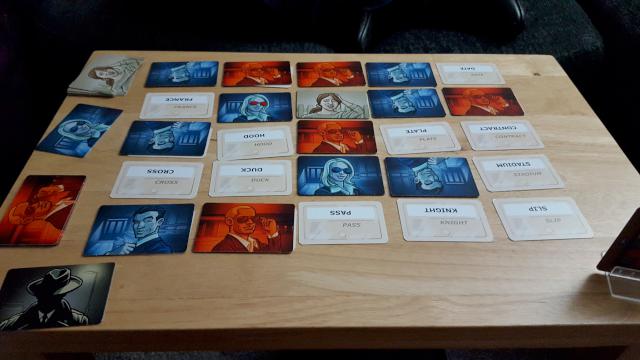
Have you ever looked at something which seemed incredibly easy from the outside, and then as soon as you tried it suddenly realised it’s harder than balancing the moon on the head of a squirrel with ADHD? Codenames can feel a bit like that sometimes. On the surface it’s a simple game where you’re dreaming up one word clues which join together several other words, but in practice and under pressure it’s tough to master, easy to screw up and very easy to enjoy.
The general premise is reasonably simple; 25 cards are laid out in a 5×5 grid on the table, each with a random word on it. Players are split into two teams which each team assigned a colour out of red or blue, and one player on each side is assigned the role of spymaster – other players are field operatives. The spymaster needs to give their team clues to the location of their agents, known only by their codenames, by coming up with a single word which links some of the words together. The spymasters, and only the spymasters, have a map in front of them highlighting which card positions belong to the blue and red teams, and with the dealing of the cards and choice of map totally random in every game, it’s practically impossible to have the same combination twice.
Having taken in which cards they need their team to choose, it’s time to start dreaming up the clues. It may be, for example, that two of your agents are known as “Knife” and “Cow”, so you’d suggest “Butter, 2” as your clue: that is, two words that relate to butter. Meanwhile, in the brain of one of your operatives, they’ve formed the link between butter and another word on the board which you hadn’t even noticed. They suggest “Fridge”, something which is blindingly obvious as soon as they say it, but just so happens to be the codename of an agent from the other team which you’ve just gifted to them. It’s around now that the arguments start, with both parties blaming the other for (and I quote) “totally s**t clues” or “f**king useless guessing” – when the game rests on a knife-edge, it can get a bit heated within your teams.

Not all cards are agents though; some are innocent bystanders, and picking one of these won’t penalise you any more than stopping your turn and preventing you from making any more guesses. But there’s one other card, one which will stop the game there and then if someone mentions the codename in question: the Assassin. The spymasters need to avoid this word like the plague, because if their team picks it then it’s an instant loss. As such the idea of your teammates guessing answers out of blind hope is a nervous tactic which causes even more arguments when it goes wrong, in fact most of our games ended with the Assassin as opposed to either team finding all of their agents successfully. It’s a perfect addition, which probably makes the game work as well as it does. Without this extra danger I don’t think Codenames would be anywhere near as fun as it is. Something else which makes things more enjoyable is the inclusion of a sand timer, something which has no real rules apart from the fact that anyone can, at any time, grab the timer and flip it over if someone is taking too long. Maybe a team leader is taking forever to find a clue, or the rest of the team can’t decide which cards to pick. It keeps things ticking along at a nice pace, and as such games take 10 or 15 minutes to play, and just moments to set back up again. Within an hour you can easily have played 3 games, had 23 arguments and thrown 2 remote controls at the cat as a result of you guessing the wrong card, just from thinking that beavers live in Norwich.
As a competitive team game then, Codenames sounds like it has the potential to be a lesson in frustration, but it’s really not. The arguments are hilarious, and trying to get into the same mindset as your operatives in order to deliver genuinely useful clues is a very tricky thing to do, but very awesome when it actually works. With a few mates, or at a low-key party, this would serve as excellent entertainment, and certainly something I’ll keep to hand for quite some time.
But what about playing with just two of you? The very mechanics of the game mean the competitive edge is out of action (there’s not much challenge when everyone playing knows where the agents are) but there’s a great variant explained in the rules whereby the opposing team is simply the spymaster revealing one enemy agent after each turn taken, and the other player acting as the sole operative trying to guess the clues. It works extremely well; myself and my wife had several games with varying levels of success (ranging from “none” to “not much”) but it was a great laugh and a very enjoyable way to spend an evening.
The box proudly boasts that Codenames is the “Number 1 Party Game on BoardGameGeek” and it’s easy to see why. It takes minutes to work out, and has so many different cards and layout maps that the probability of getting the same layout twice is as close to zero as you could get without actually being zero. You could play this every day for years and not get even similar layouts coming round twice. As such it’s extremely easy to recommend to anyone looking for a game which can be played by a huge range of people, and certainly a game to add to your collection if you want something which takes under 20 minutes but can still fill an evening. Very, very enjoyable.
Codenames
Available Now, RRP £13.99
Find your local stockist here

This game was recommended recently on video and board gaming podcast “DLC”, so along with TGR’s recommendation, I’m going to pick it up for the family to play this Christmas (along with Wits and Wagers).